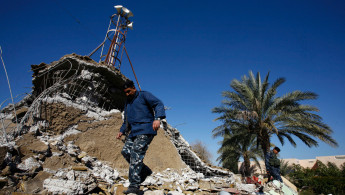Iraq: Four mosques blown up in Babylon
Sunni mosques were attacked in Hilla in Babylon province, killing a muezzin prayer caller, as fears of sectarian strife grow following the Saudi execution of a prominent Shia cleric.
3 min read
Iraqi police inspect the debris at the Al-Fateh mosque after Monday's bombing [AFP]
A group of men bombed and burned down four Sunni mosques in Babylon province in central Iraq on Monday, amid fears of renewed sectarian strife following Saudi Arabia's execution of a prominent Shia cleric.
Militants wearing military uniforms detonated explosives at the mosques in the Hilla region overnight and shot dead a muezzin - the person appointed to recite the Muslim call to prayer - near his home in Iskandariyah.
The targeted mosques included Al-Fateh mosque in Sinjar village, Al-Asriyah and another mosque in northern Hilla, and the Ammar bin Yasser mosque in the Bakerli neighbourhood of central Hilla, according to a local source.
The mosques were completely destroyed and ten neighbouring homes were damaged.
A member of the local council in Hilla, Ahmad Abd al-Tai, said the attack on the mosques "came as a response by the militias to the execution of the cleric Nimr al-Nimr".
He told The New Arab that people in Babylon province were angry and that some politicians were mobilising them to go out and protest "until the Saudi ambassador leaves Iraq".
A police officer told AFP: "After we heard the explosion, we went to its source and found that IEDs [improvised explosive devices] had been planted in the mosque.
 |
They took advantage of the cold weather, there was nobody outside - Iraqi police officer |
 |
The police captain said three or four men in military uniforms were involved in the bombing.
"They took advantage of the cold weather, there was nobody outside," he said.
A medical source in Hilla said three people were wounded in the explosions.
There was no immediate claim of responsibility for the blasts, nor for the killing near the town of Iskandariyah, about 40 kilometres south of Baghdad.
A local councillor identified the slain muezzin as Taha al-Juburi of the Mohammed Abdallah Jabbouri mosque in Haswa.
"He was ambushed by unknown gunmen near his house," a source in Iskandariyah police said.
A doctor also confirmed his death.
Regional tensionIskandariyah is part of a mixed Sunni-Shia area south of Baghdad which was once dubbed "the triangle of death" and was badly affected by sectarian violence in the past decade.
Pushing back the Islamic State group in this region after the extremist militants took over large parts of the country in 2014 was one of the priorities of the government and allied Shia militias.
That was achieved in a few months and IS has been largely eradicated from the area, but violence - not just of a sectarian nature but also crime-driven - has remained frequent.
The execution at the weekend in Saudi Arabia of prominent Shia cleric Nimr al-Nimr sparked outrage in Iraq.
Shia politicians and clerics unanimously condemned the execution but several religious figures in the Sunni minority also denounced it.
Iraq's interior ministry condemned Monday's attacks, which it said were an attempt to incite civil strife but did not blame any particular group.
The attacks were "perpetrated by infiltrated elements who want to revive sectarian unrest against the backdrop of the latest incidents in the region", it said, in an apparent reference to the consequences of Nimr's execution.
Protests took place in Baghdad and elsewhere in the country, including in the cities of Karbala and Nasiriyah.
Another demonstration called by prominent cleric and militia leader Moqtada al-Sadr was due to be held later on Monday.
Iran has accused Saudi Arabia of using Nimr's execution to stoke sectarian tensions in the region.
Tehran has warned the Gulf monarchy it would pay a "high price" for the execution, which was one of 47 carried out by Saudi Arabia on Saturday.
The Saudi embassy in Tehran was firebombed by an angry mob, prompting Riyadh to respond by announcing it was breaking off diplomatic relations with Iran. Several Saudi allies, including Bahrain and Sudan have also broken off relations, while the UAE has officially downgraded its diplomatic presence there.





 Follow the Middle East's top stories in English at The New Arab on Google News
Follow the Middle East's top stories in English at The New Arab on Google News


